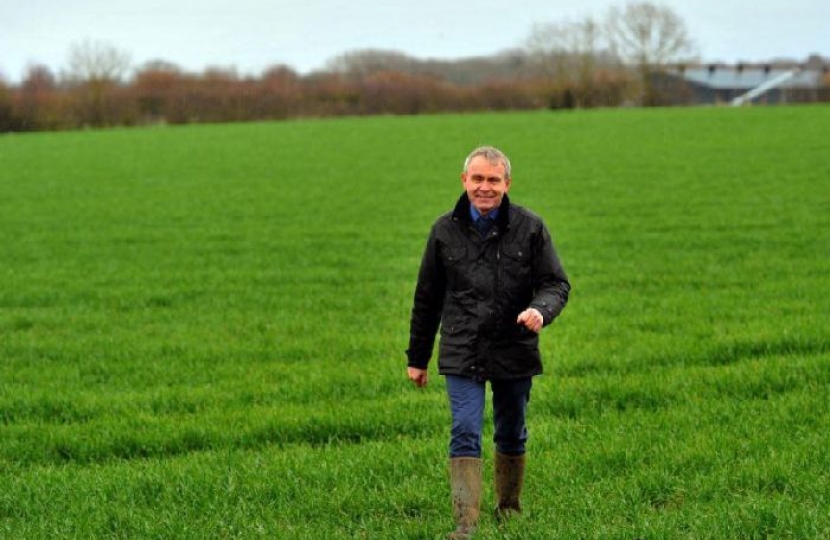
Since joining the Department for Environment, Food and Rural Affairs (Defra) a few weeks ago, I have quickly realised the scale of the work the department is undertaking to prepare for all Brexit scenarios.
As a farmer myself – my family’s farm near Castle Howard goes back to 1850 – I am very aware of the opportunities that leaving the European Union presents. I also believe that the best approach is to leave the EU with a deal, a view I know is shared by many farmers, including those who voted to leave.
As the Prime Minister has said, we have a deal that delivers what the British people voted for and takes back control of our money, borders and laws. Our priority is to get that deal through Parliament.
However, we also need to prepare for the possibility of leaving without a deal, and making sure that farmers and food producers know what they can do to prepare. The preparation work at Defra, from maintaining trade continuity to ensuring that EU workers can still travel to the UK to work on our farms, is significant.
Trade
British produce, and particularly that from our great farming counties like Yorkshire, is rightly known around the world for its quality and provenance. We have relied on free and frictionless trade with the EU to ensure that produce exported is fresh and maintains our well-deserved reputation for quality.
The Government has published the details of a transitional tariff regime which will apply if the UK leaves the EU without a deal, protecting producers where they need it most while avoiding any negative impacts on consumers. This includes tariffs and tariff rate quotas to the sheep meat, beef and poultry sectors.
Tariffs will also be applied to butter, cheese and pig meat, which will protect these sectors from cheaper food imports flooding the domestic market in the event of a no deal.
Avoiding delays at the border is a key concern. In a no deal scenario, businesses exporting animals and animal products to the EU will now need to apply for an Export Health Certificate (EHC) before they export.
These businesses also need to make sure their trade route passes through a Border Inspection Post (BIP) when entering Europe. All the guidance and certificates are available online for businesses to familiarise themselves with before exit day.
For food imports from the EU, there will not be any new border checks in a no deal but importers will need to notify authorities using a new system called the Import of Products, Animals, Food and Feed System’ (IPAFFS). This has been launched to replace TRACES, the EU’s Trade Control and Expert System. Again, the latest guidance on this is all available online.
Farm funding
Whether we secure a deal with the EU or not at this point, farm payments via the Basic Payment Scheme, Countryside Stewardship and Environmental Stewardship schemes will continue as normal this year. Farmers just need to make sure they continue to follow the same rules and guidance
I am looking forward to moving forward the Agriculture Bill in the coming months and giving farmers the certainty they need about what our future system will look like once we leave the Common Agricultural Policy.
In the meantime, funding will continue to be allocated to farmers in 2019 and 2020 in the same way as it is now. We have also pledged to commit the same cash total in funds in farm support until the end of this Parliament. We also need to up our game in delivering payments for agri-environment schemes and I know the RPA is hard at work to make improvements.
Farm workers
Many farm businesses, and particularly those growing with peak harvest requirements, have relied on seasonal labour from the EU to help out during the busiest months.
If we do leave without a deal, European citizens arriving after exit day can continue to travel to the UK to work on our farms, staying for up to three months under something called the European Temporary Leave to Remain Scheme. Under this, there is then the opportunity to apply to stay in the UK for up to three years. This will ensure that businesses continue to employ the seasonal workers from the EU that are so needed during these summer months.
We have also rolled out a Seasonal Workers Pilot, which will test how a process for recruiting workers from outside the EU to UK farms would work for our farmers and growers.
Published guidance
At times of uncertainty, it is important that everyone is prepared as much as possible. The Government is doing everything it can not just to secure a deal but also to mitigate the impact of leaving without a deal. We also have the power to intervene to support the most vulnerable sectors and will not hesitate to provide the support required.
We hope for the best in the coming weeks, but have prepared for all eventualities.
Published by Yorkshire Post.

